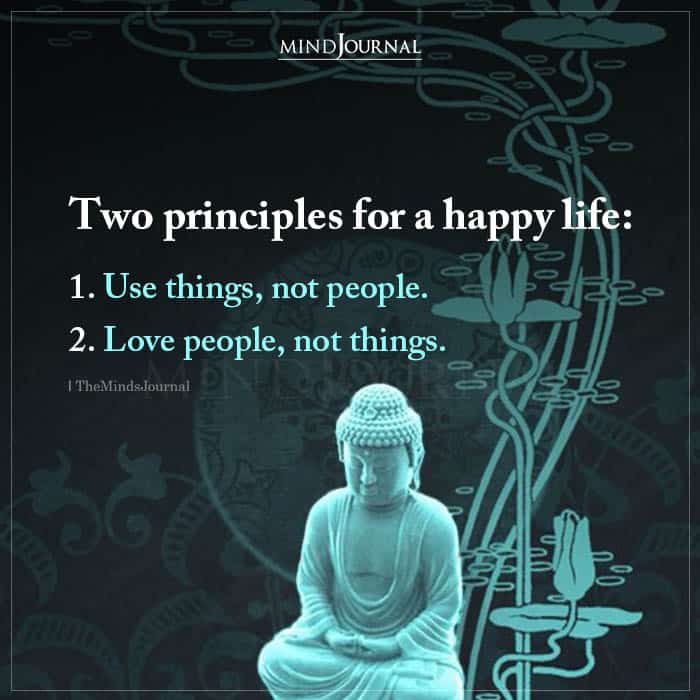Being “spiritual” is a process of ongoing, daily action. Spiritual principles of recovery are guiding concepts that teach us the value of things like patience and gratitude to heal ourselves from the inside out. Imbibe these spiritual gifts in your life now!
“Throughout time, there have always been those that need help and those that give help. Sometimes we are the ones in need of help and other times we are the helper. It is in this giving and receiving that our humanity is shared and our highest potentials are reached.”
John Bruna
With the December holidays—Hanukah, Christmas, Kwanzaa—most of us are pulled in two seemingly contradictory directions: the materialism inherent in buying and giving gifts, and the generosity of spirit evidenced by an increased attitude of goodwill toward oneself and others.
Although the giving of material gifts to others can be an extension of spiritual goodwill, material and spiritual generosity are two very different things that are frequently in conflict. By spiritual, I am referring to attitudes and actions relating to, or affecting the human spirit or soul, in contrast to material or physical commodities.
Many people are unable to give much in the way of material gifts, but by practicing being consciously aware of and applying specific principles, anyone can become more spiritual.
Spiritual principles represent meaningful values and ethical practices. While the application of spiritual principles is emphasized in 12-step programs of recovery, many of them are universal—they have been part of most of the world’s important spiritual traditions for centuries.

Some of these may seem so straightforward that you’ve never considered them to be “spiritual.” Yet, that is precisely what they are. They represent the antithesis of the dis-ease and self-absorption fueled by habitual patterns of obsessive thinking, emotional attachment/avoidance, and compulsive behaviors that imprison so many people so much of the time. Such spiritual principles open and soften the heart, connecting us more deeply and intimately with others, with the world around us, and with our authentic selves.
Here Are 10 Spiritual Principles to Heal Your Life
1. Acceptance
Acceptance is about acknowledging and come to terms with the reality of a given situation. It is important to understand that accepting something does not imply that one agrees with or is happy about it. You can dislike situations and still accept them. Finding ways to accept those things that are beyond your control to change provides freedom from having to fight against the realities you find disagreeable, uncomfortable, or painful.
2. Open-Mindedness
Open-mindedness means being respectful of and receptive to new and different possibilities. This includes being open to suggestions and ideas that we haven’t previously considered, and perspectives that may be significantly different from our own.
Related: 15 Signs and Symptoms Of Negative Energy In Your Body
3. Gratitude
Gratitude is about feeling and expressing appreciation for what we have (however little it may be). It functions as an antidote for attachment to what we want but don’t have and aversion to what we have but don’t want. Gratitude is the opposite of discontent.
Neuroscience demonstrates that gratitude reduces stress and increases well being by stimulating the hypothalamus and the ventral tegmental area—part of the brain’s reward/pleasure circuitry (Cereb Cortex. 2009 Feb; 19(2): 276–283. Published online 2008 May 22. doi: 10.1093/cercor/bhn080).
For many people, gratitude is arduous, because life is arduous. Objectively, some people have more to be grateful for than others. And yet, it is possible to mobilize gratitude in spite of deprivation or feelings of anxiety, sadness, anger, depression, fear, or physical pain. Sometimes you may have to look a little harder to see the blessings in your life, but there is always something to be grateful for, no matter how negative or desperate the situation seems.
4. Humility
Humility is about recognizing and accepting one’s own assets and liabilities/strengths and weaknesses, based upon realistic self-perception. Like all human beings, you are neither all good nor all bad. In practicing humility we accept that our health and well-being is enhanced by the assistance of others, as well as a connection to that which is beyond ourselves. Humility is sometimes described as not thinking less of oneself, but rather thinking of oneself less.
5. Patience
Patience is the ability to wait without worry or complaint. It is related to the ability to tolerate frustration and delay gratification. When confronted with an uncomfortable or upsetting circumstance it takes patience to allow time to pass before responding, making a decision, or taking action. Being tolerant of and with others is a manifestation of patience.
Related: 10 Passionate And Intense Signs You’re In Spiritual Love
6. Integrity
There are two levels of integrity: when what you do is consistent with what you say—when your actions match your words, and when how you seem on the outside fits with how you feel on the inside—when the way your exterior appears to others matches your internal mental-emotional status. When you maintain conscious contact with your core values and your behavior aligns with your values, the practice of integrity becomes natural.
7. Faith
Faith is belief not based on actual evidence/proof. The practice of faith includes the belief in a power beyond oneself, along with a conscious relationship with that “higher” power.
Faith need not have anything to do with popular or anthropomorphic conceptions of God or any connection to organized religion. In addition to courage, it takes faith to walk through that which you fear, and the greatest faith comes from walking through those circumstances you are most afraid of.
Practicing faith means relinquishing the need to try to control people and situations, trusting that things will work out the way they need to (which may well be different from the way you want them to).
8. Forgiveness
To forgive is to let go of the hurt, ill will, and resentments that accompany perceived injustices—real or imagined—you have toward other people, groups, or institutions. Forgiveness can be extended to others whether or not they admit their part in a situation.
John Friel, Ph.D. has described forgiveness as the willingness to let go of all hope for a better past. Holding on to ill will and resentments is self-defeating in that you hurt yourself more than anyone else. Buddhist teachings compare holding on to anger with picking up a hot coal with the intent of throwing it at someone else. No matter what happens, you get burned.
When you get caught up in resentment, you become attached to the source of it—giving it power over you as the intense emotions eat away at you like acid, and the thoughts that drive those emotions rent space in your head and steal your time and attention.
Forgiving is not about approving or condoning what’s transpired, it’s about letting go of it. It’s helpful to keep in mind that forgiving oneself can be an important part of the process of learning to forgive others.
Related: Spiritual Health: What Is It And How To Improve It
9. Self-acceptance
Forgiving yourself for your own past misdeeds is part of self-acceptance. Self-acceptance is being fundamental okay with oneself without reservation. It is the sense that, as a human being, you are “good enough” exactly as you are, with all of your challenges and imperfections. It is the understanding and knowledge that nobody, including you, has to be perfect in order to belong in this world.
10. Service
Service is about making intentional contributions to the quality of one’s environment, often in the form of giving back or paying forward by helping others. Service is usually associated with volunteering one’s time and energy. This can be on a one-time or situation-specific basis, or an ongoing commitment.
Service can take many different forms—people can be of service to their families, friends, organizations, neighborhoods, communities, etc. Being of service is an important part of twelve-step program participation, where the intent is to give to others in the same way that others have given to us.
Our attention is a precious resource. Whatever we focus our attention on tends to expand and assume greater importance. With our attention, we can effectively water the equivalent of flowers or weeds. Usually, our attention drifts unconsciously and reflexively from stimulus to stimulus consistent with the thoughts and images our minds continuously generate.
Intentionally practicing the awareness and application of spiritual principles helps to train our minds, strengthening our ability to direct and maintain our attention in ways that enhance our learning, growth, and healing.
Related: 16 Symptoms of Spiritual Fatigue and Ways To Cope
Copyright 2015 Dan Mager, MSW
Author of Some Assembly Required: A Balanced Approach to Recovery from Addiction and Chronic Pain
These healing principles will not be obtained overnight but with practice anything can be achieved! Let us know your thoughts in the comments.
Written by: Dan Mager MSW
Originally appeared on: Psychology Today
Republished with permission









Leave a Reply